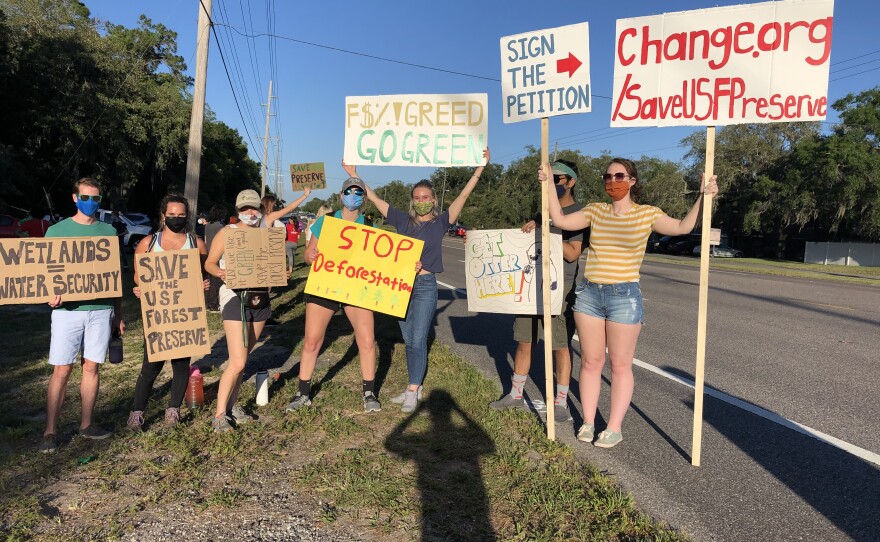Students with the University of South Florida spent their Friday evening protesting just outside the USF Forest Preserve, off Fletcher Avenue in Tampa. It's a response to the college's interest in possibly developing the land and the nearby golf course.
More than 50 people waived signs at passing cars, some of which honked in support of their cause to prevent building on the 769 acres.
"The preserve is not for sale! Your construction plans will fail!” they chanted.

Jeannie Mounger, a graduate student in USF's Integrative Biology Department, is one of the organizers for the group Save USF Forest Preserve.
"I have actually put my PhD studies on hold for the last month to organize all of this,” she said.
She now spends her days running the social media campaigns and working with conservancy groups in the hopes that they'll draft alternate proposals to the university's development inquiry. Mounger said this property is important to her because she teaches students hands-on there.
"I'm also an eighth-generation Floridian, and I care a lot about our environment. I understand what's at stake here," she said.
The parcel is home to the dwindling sandhill habitats, where threatened wildlife species live.

At least two USF professors were also present during Friday's protest and spoke against development.
"I stand here representing, not only myself, but a large number of faculty members who are 100% against touching a grain of soil on this land for any kind of development," said David Lewis, an associate professor in the Department of Integrative Biology.
He said this land preserves whole ecosystems. Standing next to him was his colleague, Professor Kathleen Scott.
“What do we want USF to become? Do we want it to become a Walmart across the street?” asked Scott to the crowd, which responded, “No!” and “Hell no!”

There are also indigenous remains currently untouched within the preserve. That led to support from the American Indian Movement and the organization Florida Indigenous Rights and Environmental Equality.
"The University of South Florida needs to stay away from that burial site. They should protect the whole thing, but they risk their police officers’ lives if they come and touch that burial site," said Sheridan Murphy, a representative of both indigenous groups.
As of Sunday, Save USF Forest Preserve had garnered more than 19,600 online petition signatures.
A spokesman for the university, Adam Freeman, said in an email that USF has a responsibility to regularly examine options for the highest and best use of institutional assets. For example, leasing parts of the property in question to fund student scholarships, recruit new faculty or support research opportunities.
Freeman added that the inquiry does not mean any action will take place, and said it is possible that submissions may only include development of a portion of the land, like the golf course and not the forest preserve.
“We recognize that this land has significant value to the university in support of research and academic opportunities in its current use, which is a key consideration in the Request For Information process,” he said.
“USF leadership has already met with faculty and student representatives and we are committed to keeping these key stakeholders as a part of the process moving forward through timely communication and consultation involving decisions.”

But Jeannie Mounger pointed to a question and answer document released by USF on May 6 that doesn’t really support that idea. Although it’s unclear who exactly is asking the questions, one of them inquired about the availability of university representatives, like biology researchers, professors, or administration to talk about what they would like to see happen on the land.
USF answered: “Though appropriate, this interaction is not available to provide timely information for this RFI.”
Developers have until May 24 to submit their responses to the Request For Information.
“It speaks volumes when a global research university that prides itself on STEM innovation and biological research fails to value conservation, biodiversity, indigenous cultural heritage and sustainability, despite the image that they like to project to the state and the country,” said Mounger.
“If we can't trust public institutions that are committed to higher learning to value and protect not just sensitive ecosystems, but important sites of indigenous cultural heritage, who can we trust?”
Ultimately, the advocates want USF officials to preserve the property through a conservation easement, but Mounger thinks this fight is going to be a long one.







